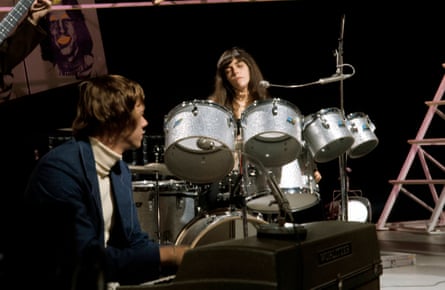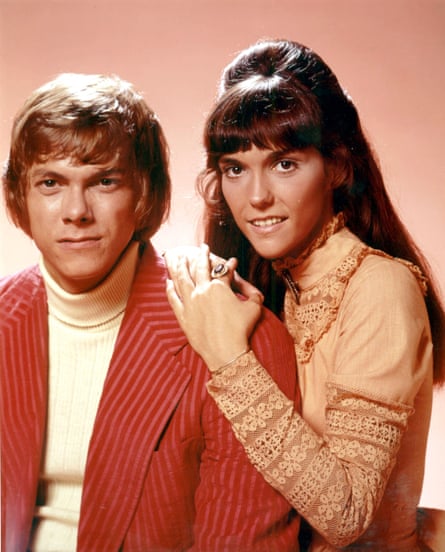With their rapturous harmonies and lush production, the Carpenters were one of the biggest acts in the 1970s, selling over 100 million records with global hits like Close to You, Only Yesterday and Please Mr Postman. This year marks the 40th anniversary of lead singer Karen Carpenter’s death at the age of 32, as a result of complications from anorexia. Since then, she has been portrayed as a victim, dominated by her family and a ruthless music industry.
With my biography, I wanted to reframe Karen’s life and legacy. The fact that she was an artist at the top of her game suggested to me she was not a submissive puppet. In talking to friends, musicians and former lovers, I discovered a determined, pioneering woman with her own sense of agency. Although her brother Richard has been attributed a Svengali role as the key arranger, Karen early on was an equal driving force in the band. “She was the boss, the one in control of stagecraft and directing the musicians. She was an amazing singer and drummer – real precision work,” recalls DJ/producer Jeff Dexter, who met Karen in 1974 when the Carpenters were rehearsing their Talk of the Town show.
At 15, Karen played in her high-school marching band and idolised middle-aged jazz drummers such as Joe Morello and Buddy Rich. “When I took up drums, everybody looked at me funny, but I didn’t really care,” she said. After gigging around LA for several years, she and Richard were signed to A&M Records in 1969, and scored their first No 1 hit in 1970 with a lavish, swinging rendition of Burt Bacharach’s song Close to You.
As the hits racked up, Karen was pressured by her brother and A&M to forgo the drums for a role as decorative frontwoman. Much of her studio work was taken over by Hal Blaine, a top session drummer from LA’s Wrecking Crew of musicians. In order to sell the band and the songs, Karen was deskilled as an instrumentalist. “I didn’t start playing just to be a gimmick,” she said. “I took pride knowing how to play my instrument. It hurt me that I had to be upfront.”

Feeling exposed and self-conscious, Karen began a stringent diet and exercise regime. “I never thought of her as fat, but she had that complex,” recalls the Carpenters’ video director, Clare Baren. “Now you can have a big ass and be a huge star, like Lizzo. But it was different for women in the 1970s. All [those] handling Karen’s career were men. I’m sure she got told ‘You have a big ass’ by the wrong people, many times.”
Tour manager Rebecca Segal noted a change in Karen. “There were a few times on the road that I would look at her and think, somebody’s got to do something. I did say to one person, ‘Somebody should be aware that she’s not eating’. But not much was known about anorexia then, and people didn’t understand the kind of slippery slope she was on.” By summer 1975, Karen’s weight had plummeted to 91lbs (41kg) and she checked into Cedars-Sinai Medical Centre, the first of several stays in hospital.
For the next eight years, Karen’s weight fluctuated, but she remained resolutely focused on her music. When Richard’s own problem with quaalude addiction led him to rehab in 1979, Karen took the opportunity to record an ambitious solo album with Phil Ramone in New York. At 29 years old, she was discovering her sense of autonomy as a woman.
“Karen yearned for more control over her art. That was a big part of her motivation,” says Bob James, a jazz/fusion arranger on the project. Karen made a fine female soul album at a time when artists like Donna Summer, Linda Ronstadt and Diana Ross were in the ascendant. Despite initial support, A&M executives rejected it, wary of taking a financial risk on Karen’s new direction.

“She was beginning to free herself, but she was not free. She had one foot in the Carpenters and one foot in the new Karen Carpenter,” says former boyfriend, songwriter Tom Bahler. “She was swimming upstream. No … up the waterfall.”
Karen did seek therapy for chronic anorexia in the last year of her life with New York psychotherapist Dr Steven Levenkron, but the treatment came too late. In September 1982 she was admitted to intensive care at Lenox Hill Hospital, weighing just 77lbs. After gaining a little weight, she discharged herself and went back to LA but died a few months later of heart failure on 4 February 1983.
Karen’s tragic death marked the beginning of greater awareness about eating disorders and mental health. She kept her battle secret, but many younger female singers – such as Taylor Swift, Kesha, Halsey and Lady Gaga – now critique that cultural idealisation of thinness. What contributed to Karen’s isolation was the belief that anorexia was shameful and taboo. Younger women emboldened by #MeToo feminism are calling for more support.
“I thought I wasn’t supposed to eat food,” says Kesha. “Then, if I ever did, I felt ashamed … the sicker I got, the more people were saying, ‘You look so beautiful. So stunning’.”
There are signs that the music industry is changing, with acknowledgement of the toxic impact on artists of hypersexualisation and body shaming. Senior Sky executive Rebecca Segal has seen a significant shift in attitudes in recent times. “That we can even talk about these things is wonderful,” she says, “but there is still stigma and still more work to be done. Mental illness is an invisible disability. Living anyone’s life other than your own – your mother’s, your brother’s, your fame – that’s a painful life for anybody.’’
Harpist Gayle Levant believes her friend Karen was “emotionally starting to deal with it, but her body had given up”. She still sees hope in Karen’s legacy. “The gift she gave us was her art, the voice in her heart. She didn’t just sing the words, she lived them. She told the story.”
Lead Sister: The Story of Karen Carpenter is out now
Stay connected with us on social media platform for instant update click here to join our Twitter, & Facebook
We are now on Telegram. Click here to join our channel (@TechiUpdate) and stay updated with the latest Technology headlines.
For all the latest Music News Click Here
